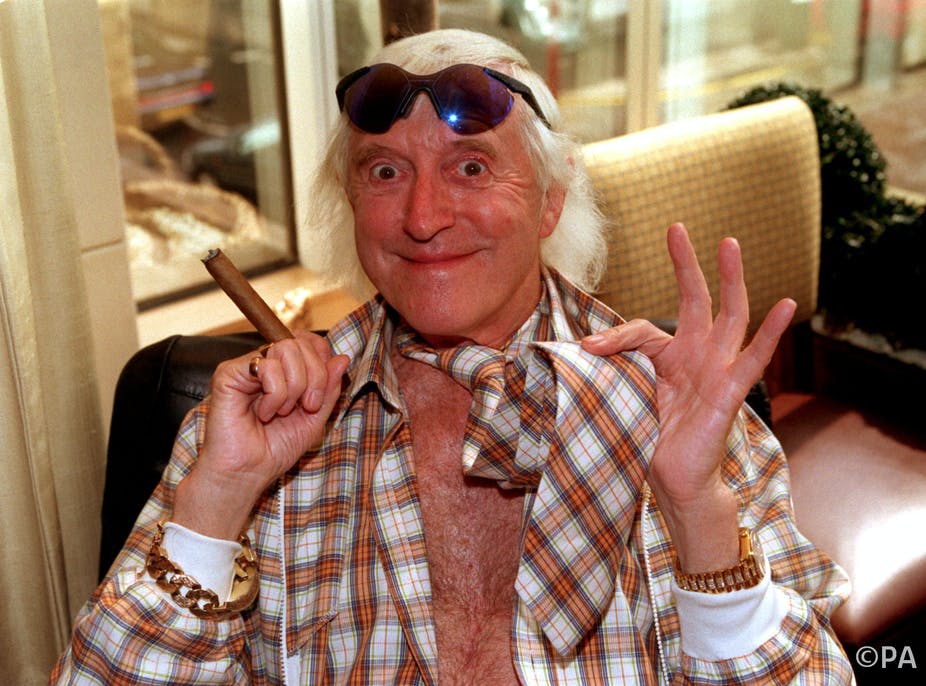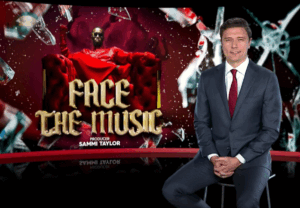Jimmy Savile play may revolt some, but it’s a necessary part of confronting the horror

By John Drakakis
Professor in English Studies, University of Stirling
The announcement that a play about Jimmy Savile is to be staged in London this summer has raised eyebrows. Unsurprisingly, but isn’t it too early? Should such things be represented onstage before an audience at all?

Doubtless there is more to emerge from Savile’s despicable and clearly criminal exploitation of a system of public charitable service. Police investigations are still going on and further material is likely to emerge. This causes many to question whether material of this kind should be shaped into a play while the story is still unfolding. The CEO of a charity that helps victims of child abuse has said that the play is “cashing in on pain”.
These qualms doubtless come from the idea that theatre is fiction, and that even if it’s a “true story”, dramatic elements have been introduced into the narrative. The play, An Audience with Jimmy Savile, is by journalist and author Jonathan Maitland. The comedy impressionist and actor Alastair McGowan is to take the part of Savile – and the play will repeat actual words that Savile used in his many public appearances. But the script is unlikely to be completely verbatim and there is the question of how the victims’ voices should be handled.
Far from journalism
However close Maitland keeps to the source material, this play will not be journalism. Material gathered as part of a journalistic investigation, whatever slant is put on the narrative, has a claim to represent reality directly. The photographic power of film and television gives us unprecedented access to “reality”, even though we are often aware that what we see is a representation of that reality. The recent Leveson inquiry exposed the lengths to which some journalists were prepared to go in the way of shaping narratives to satisfy the covert agendas of their editors.
But while journalism may be “dramatic” in its revelations, it is different from an art form that selectively represents reality. It remains to be seen what shape Jonathan Maitland’s play will take, since all plays have beginning, middles and ends – and the Savile saga has yet to end.
The unknown quantity in this whole project must be the voices of the victims. It will not be sufficient to expose Savile’s thoroughly corrupt strategies. Maitland says that there will be readings from witness statements. But care will need to be taken to ensure that their voice carries an appropriate and authentic emotional power.
We need to remember that many of Savile’s victims have already been asked to relive their ordeal – and we may feel that representing it at all might simply force a painful re-enactment by those who have suffered enough and who, so far, have received little redress.
The perfect time
So yes, there are many reasonable objections. But we need to remember that drama, by its very nature, confronts its audiences with the society in which they live, no matter how unpalatable that confrontation might be. It is by definition controversial, a principal way that any culture talks to itself about issues of the day. Drama shapes these issues into a plausible narrative.
We need also to remember that good drama is not “entertainment” in the sense that it diverts us from the business of living; rather it engages us in the business of living (and dying), in the ethics and politics of living – and in questions of “truth”. It forces us to confront ourselves. That we may not like what we see is not a reason for suppressing it.
Maitland’s insistence that the play is not “exploitative” is well taken, and it is clearly his intention to give Savile’s victims a proper voice. Those who think that this whole project is inappropriate will need to answer the question that is most frequently asked about this and other cases of appalling behaviour: why was it allowed to happen? The simple insistence upon this question is reason enough to stage such a play.
The answer to that question may well help us towards a more open, a more transparent, more just and more humane society than the one that allowed the odious Savile and a number of senior members of the establishment to thrive and to escape punishment. Article republished with permission from TheConversation under a commons license.
NOTE: Jimmy Savile was loved by British audiences the same way Bill Cosby was loved by American audiences. Most of the public, accustomed to their television persona’s refused to accept the fact that both were proven sexual predators.


